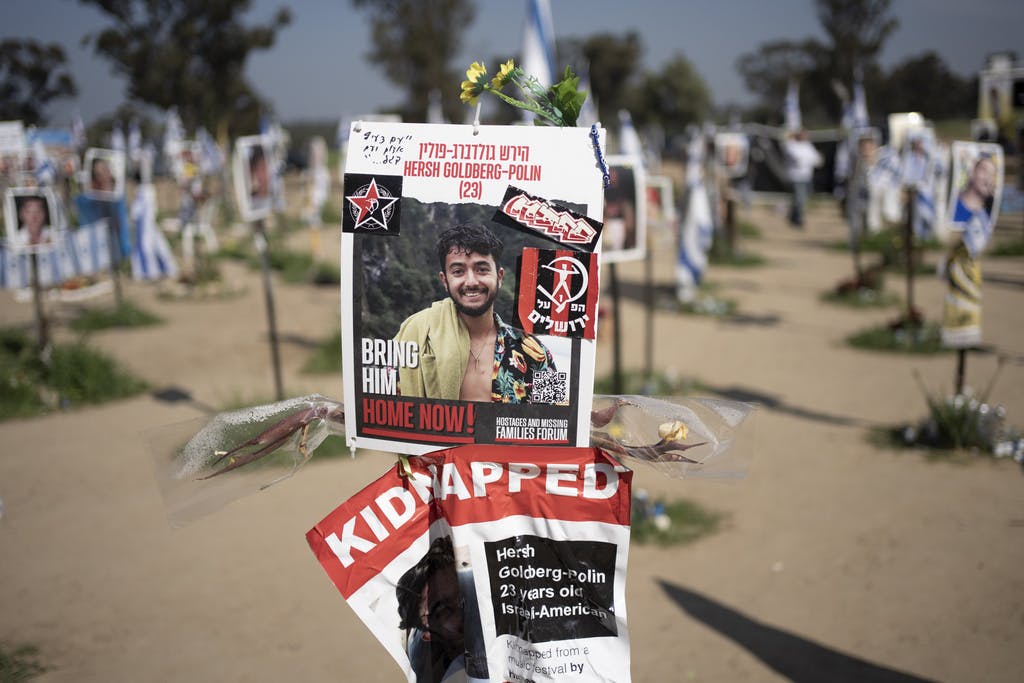Biden’s Renewed Focus on Hostages Raises Questions About the Direction of Dealings With Hamas
Does Washington now plan to exert serious pressure on the terrorist organization holding the hostages? Or is Biden making a last-ditch attempt to stop Israel from attacking Hamas’s remaining bastion at Rafah?

Does President Biden’s renewed attention on the 133 hostages held in Gaza, including Americans, signal that he now plans to exert serious pressure on the terrorist organization holding them? Or is it a last-ditch attempt to stop Israel from attacking Hamas’s remaining bastion at Rafah?
“We call for the immediate release of all hostages held by Hamas in Gaza for over 200 days,” Mr. Biden said Thursday in an unprecedented joint statement with 17 other country leaders. The hostages “include our own citizens,” the heads of state noted, adding, “We emphasize that the deal on the table to release the hostages would bring an immediate and prolonged ceasefire in Gaza.”
Hamas responded quickly, with its Turkey-based spokesman, Khalil al-Hayya, telling Al Jazeera that negotiations are failing not because of the hostages. “The point that has blocked the negotiations is Israel’s refusal to accept a permanent cease-fire,” he said, adding that the Israelis must withdraw all forces from Gaza before negotiations can resume.
Israelis believe that the closer they get to Hamas’s Gaza commander, Yahya Sinwar, who is presumably hiding at Rafah, the more likely he would be forced to release the hostages. Conversely, American strategists seem to be dangling the prospect of hostage diplomacy as an incentive for Israel to avoid a military operation at Sinwar’s Rafah stronghold.
Mr. Biden’s X account posted on Thursday a photo of the president hugging a former child hostage, Abigail Idan, at the White House. The national security adviser, Jacob Sullivan, said that the 4-year-old girl has spent Wednesday playing inside the Oval Office.
Early in the war Mr. Biden had highlighted the young girl, an American citizen, as a symbol of Hamas’s cruel hostage strategy. The girl was released in November alongside more than 100 hostages. Several American citizens are among the 133 hostages that remain captive in Gaza.
This week Hamas released a video of one Israeli-American hostage, 23-year-old Hersh Goldberg-Polin, who lost his hand and part of his arm when abducted from the Nova music festival on October 7. “You can see that he needs medical attention, and not only to his arm,” his father, John Poln, said.
Mr. Biden’s renewed attention to the hostages comes after weeks in which he mostly focused on hardships in Gaza. As late as Wednesday, the Department of State’s assistant secretary of Near Eastern affairs, Barbara Leaf, briefed reporters at length on the humanitarian efforts to help Gazans. She did not even mention the hostages.
In addition to urging Israel to facilitate aid to Gazans, administration officials are increasingly vocal about their opposition to a military operation at Rafah, the only Gaza city that Hamas still fully controls. President el-Sisi of Egypt also warned Israel against it.
An Egyptian delegation is expected at Tel Aviv Friday, officially attempting to revive hostage negotiations. Yet, Cairo’s top concern is Rafah. During a 2008 Gaza war, Hamas demolished a border fence there that was separating Gaza from Egypt. Still traumatized, Cairo fears a repeat and a flood of refugees into Sinai.
For Israel, meanwhile, control of Rafah’s border with Egypt, and the tunnels under it, is a must. Unless it blocks future smuggling of arms and materiel there, Hamas would quickly revive its military capabilities.
Following a cabinet meeting Thursday, Prime Minister Netanyahu briefed the opposition leader, Yair Lapid, on preparations for the Rafah military operation that officials say “will happen no matter what.”
The Netanyahu cabinet also approved a limited mandate for hostage negotiators to develop new avenues for a hostage deal in talks with the Egyptian mediators. To date, all American, Egyptian, and Qatari diplomatic efforts to reach a deal for an extended cease-fire in exchange for hostage releases have failed.
Israelis are increasingly divided over who is to blame for the failure to release hostages. That in-fighting and increased American pressure on Mr. Netanyahu might have convinced Hamas that it can win the war without releasing the abductees.
Briefing reporters on Wednesday, an unidentified Washington official said “one guy” is blocking the hostage release. The Hamas leaders who negotiate at Doha and Cairo have little influence, the official said: “Ultimately, Sinwar is the guy who says ‘yes’ or ‘no.’” And Sinwar “seems determined to simply sit underground holding hostages, totally impervious to the conditions above ground for the people of Gaza,” the official said.
Under American pressure, and facing anti-government protests at home, Mr. Netanyahu has made significant concessions in an attempt to promote a hostare deal. Hamas, in contrast, has moved little from its initial demands, as evidenced by its statements after Thursday’s 18-country demand.
Could an Israeli Rafah operation break the deadlock, especially if it ends with the capture or death of Sinwar?

